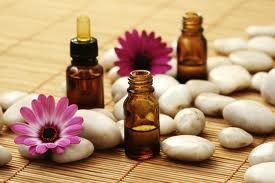Sports massage - Aromatherapy - Pilates Javea
Aromatherapy is the practice of using the natural oils extracted from flowers, bark, stems, leaves, roots or other parts of a plant to enhance psychological and physical well-being.
Personal health care Javea, reflexology and personal training.
Aromatherapy in Javea
Essential oils are highly concentrated aromatic extracts which are distilled from a variety of aromatic plant material including grasses, leaves, flowers, needles & twigs, peel of fruit, wood and roots.

Top 10 Aromatherapy oils.
- Peppermint, Mentha piperita: Useful in treating headaches, muscle aches, digestive disorders such as slow digestion, indigestion, and flatulence.
- Eucalyptus, Eucalyptus globulus or Eucalyptus radiata : Helpful in treating respiratory problems, such as coughs, colds, and asthma. Also helps to boost the immune system, and relieve muscle tension.
- Ylang Ylang, Cananga odorata : Helps one to relax, and can reduce muscle tension. Good antidepressant.
- Geranium Pelargonium graveolens : Helps to balance hormones in women, good for balancing the skin. Can be both relaxing and uplifting, as well as antidepressant.
- Lavender(Lavandula angustifolia): Relaxing, and also useful in treating wounds, burns, and skin care.
- Lemon, Citrus limon : Very uplifting, yet relaxing. Helpful in treating wounds, infections, and house cleaning and deodorizing.
- Clary Sage, Salvia sclarea: Natural pain killer, helpful s in treating muscular aches and pains. Very relaxing, and can help with insomnia. Also very helpful in balancing hormones.
- Tea Tree, Melaleuca alternifolia : A natural anti fungal oil, good for treating all sorts of fungal infections including vaginal yeast infections, jock itch, athletes foot, and ringworm. Also helps to boost the immune system.
- Roman Chamomile, Anthemus nobilis : Very relaxing, and can help with sleeplessness and anxiety. Also good for muscle aches and tension. Useful in treating wounds and infection.
- Rosemary, Rosmarinus officinalis: Very stimulating and uplifting, good to help mental stimulation as well as to stimulate the immune system. Very good for muscle aches and tension. Stimulating to the digestive system.

Aromatherapy massage in Javea
Aromatherapy can be defined as the art and science of utilizing naturally extracted aromatic essences from plants to balance, harmonize and promote the health of body, mind and spirit.
As a holistic practice, Aromatherapy is both a preventative approach as well as an active method to employ during acute and chronic stages of illness or 'dis'-ease.
 Aromatherapy is the treatment or prevention of disease by use of essential oils.
Aromatherapy is the treatment or prevention of disease by use of essential oils.
Other uses include pain and anxiety reduction, enhancement of energy and short-term memory, relaxation and reduction of eczema-induced itching.
1. What is aromatherapy?
Aromatherapy is the practice of using the natural oils extracted from flowers, bark, stems, leaves, roots or other parts of a plant to enhance psychological and physical well-being.
2. What are essential oils?
Essential oils, or aromatherapy oils, are the fragrant essence of a plant. These highly concentrated liquid oils are the foundation of aromatherapy, which is based on the idea that the aromatic oil from a plant has healing properties.
3. How are essential oils used in aromatherapy?
Essential oils are extracted one of two ways either by steam distillation or expression, or pressing. Distillation is the most prominent method used to extract aromatherapy oils, however. This technique involves steaming the plant matter until it breaks down. The byproduct of this breakdown phase is the plants fragrant oil, which is cooled, separated from the water and finally filtered into its pure essential oil.
4. Are essential oils the same as perfume?
Essential oils should not be confused with perfumes or other fragrance oils. Essential oils are natural to the plant, whereas fragrance oils are chemically produced to mimic certain aromatic scents for perfumes, colognes, candles, etc.
5. Can essential oils be applied directly to my skin?
It is not generally recommended. In their pure form, essential oils are highly concentrated and can burn your skin, or some oils will even pass through the skin and into the bloodstream. It is suggested that you mix them with a base or carrier oil which decreases the possibility of skin irritation.
6.It is not recommended to use essential oils internally. Given their concentration levels, essential oils can be toxic if swallowed.
7.What is the best way to apply essential oils?
How you apply essential, or aromatherapy, oils has an impact on their healing capabilities. You will experience better results if you use small amounts of the oils diluted in water or with a carrier oil or massage lotion. Check out our application page for more detailed methods.
8.Can I use essential oils if I'm pregnant?
Yes, but do so with caution. We recommend avoiding the use of essential oils during the first trimester, and then light use (no more than 1% dilution) through term.Oils like geranium, grapefruit, jasmine, mandarin, neroli, tangerine, and ylang ylang are considered safe oils to use during pregnancy.
9. How should I store my aromatherapy oils?
Essential oils are best kept in dark glass bottles with screw tops. They should be kept in a cool, dry space, preferably out of the direct sunlight.
10. How do I know which essential oils do what, specifically, for the body?
Certain essential oils can trigger physical or emotional effects on their own. For instance, lavender is a widely known calming agent, whereas peppermint is a mood lifter. Other oils are blended to achieve a desired physiological or psychological effect. Blending ylang ylang with grapefruit relieves stress, for example. Each oil has its own special benefit.